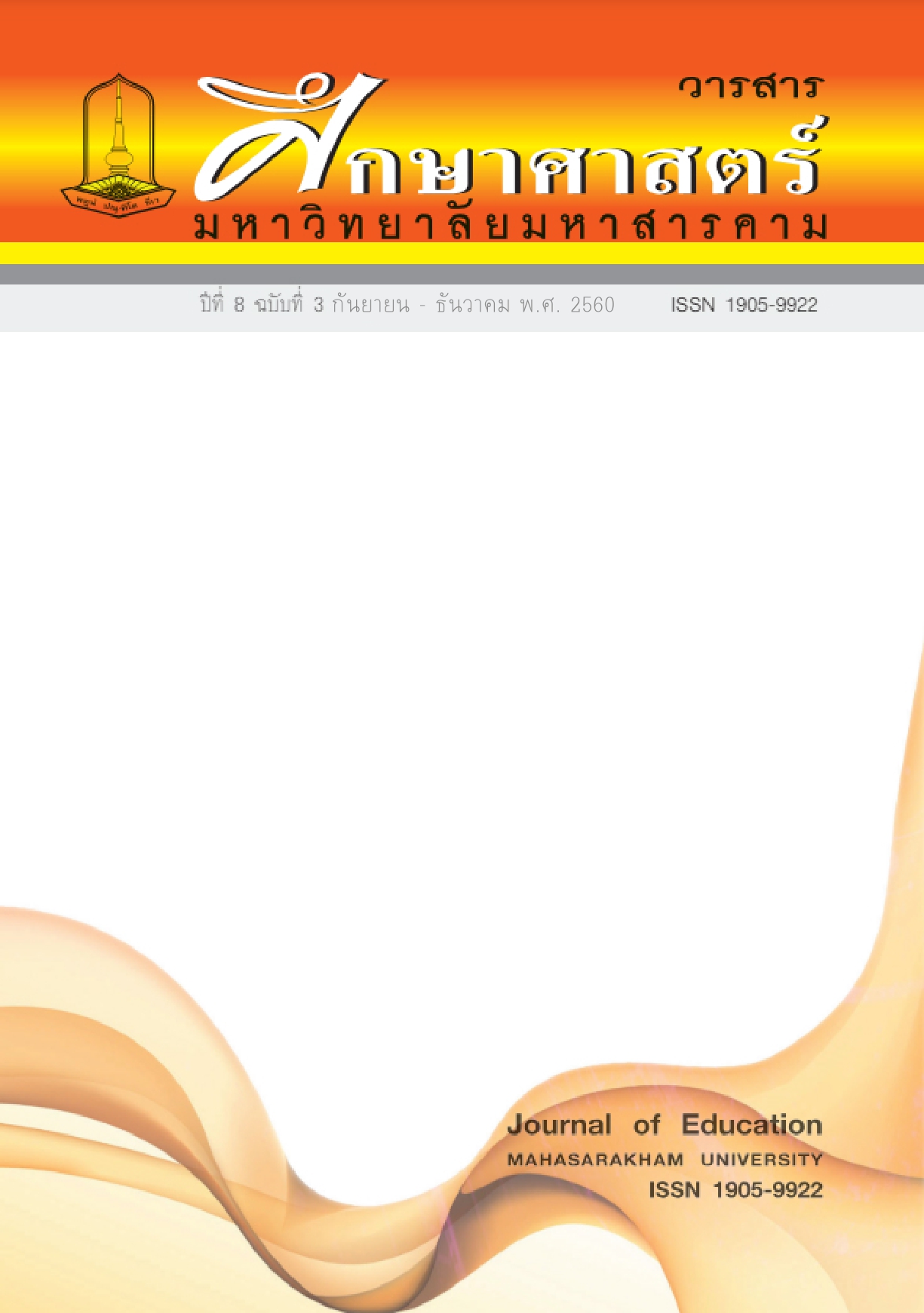A guideline to develop teacher’s competency in curriculum management and learning management in the schools of nong khai primary educational service area office 1
Main Article Content
Abstract
The research is intended to 1) To study the elements indicators for the Guideline to Develop Teacher’s Competency in Curriculum and Learning Management in the schools of Nong Khai Primary Educational Service Area Office 1, 2) To study the present condition, preferred conditions of the Guideline to Develop Teacher’s Competency in Curriculum and Learning Management in the schools of Nong Khai Primary Educational Service Area Office 1 3) To study the Guideline to Develop Teacher’s Competency in Curriculum and Learning Management in the schools of Nong Khai primary Educational Service Area Office 1. The operations consisted of three stages. Phase 1 to study the elements and indicators by taking from the Office of the Basic Education Commission 2010. Phase 2 to study the present condition, preferred conditions of the Guideline to Develop Teacher’s Competency in Curriculum and Learning Management in the schools of Nong Khai Primary Educational Service Area Office 1. Sample was included school administrators, and teachers in the area. The sample group are school administrators and teachers in the schools of Nong Khai Primary Educational Service Area Office 1 for 320 with stratified random sampling by the proportional stratified random sampling due to the size of the schools, small size for 16 administrators and 73 teachers, medium size for 10 administrators and 146 teachers, large size for 3 administrators and 72 teachers, with a total of 29 administrators and 291 teachers by using rating scale for the questionnaire 5 level. The research statistics were mean, percentage, and standard deviation. Phase 3 the guideline to Develop Teacher’s Competency in Curriculum and Learning Management in the schools of Nong Khai Primary Educational Service Area Office 1. Next was to study the guidelines by interviewing school administrators and teachers involved in teacher’s competency in curriculum management and learning management (Best Practice) from three schools with three people for each with a total of 9 people. Verification was confirmed by seven experts.
The research results were as followed: 1. There are five elements of the teacher competency in curriculum and learning management consist of: 1) to create and develop the curriculum 2) knowledge and ability to design learning 3) the learning management focuses on the learners 4) using and development Innovative technologies for learning and 5) measurement and evaluation of learning. 2. The present condition of a Guideline to Develop Teacher’s Competency in Curriculum Management and Learning Management in the Schools found that the present condition for all five sides were at a high level. Considering each aspect with the highest level was included: the learning management focuses on the learners, measurement and evaluation of learning, to create and develop the curriculum, knowledge and ability to design learning, and the lowest level of compliance was on the using and development Innovative technologies for learning. Preferred conditions in a Guideline to Develop Teacher’s Competency in Curriculum Management and Learning Management in the Schools found that the present condition for all five sides were at the highest level. When considering the descending order from the highest to lowest by their level of demand were ranked as follows: to create and develop the curriculum, measurement and evaluation of learning, knowledge and ability to design learning and the learning management focuses on the learners were the same level and the lowest level was using and development Innovative technologies for learning. 3. The result of the appropriabillity, possibility and usefulness assessment to act in keeping with the codes of possible enriching proficiency for Curriculum and Learning Management in the schools of Nong Khai Primary Educational Service Area Office 1 is found that the appropriabillity, possibility and usefulness in the highest level.
Downloads
Article Details
References
กรมวิชาการ. (2544). หลักสูตรการศึกษาขั้นพื้นฐานพุทธศักราช 2544. กรุงเทพฯ: โรงพิมพ์คุรุสภาลาดพร้าว.
คณาจารย์กลุ่มหลักสูตรและการสอน คณะครุศาสตร์ มหาวิทยาลัยราชภัฏอุดรธานี, (2553).
จิตติกา ชัยภักดี. (2559). แนวทางการเสริมสร้างสมรรถนะในการปฏิบัติงานของครูในโรงเรียนสังกัดองค์การบริหารส่วนจังหวัดนครราชสีมา. วิทยานิพนธ์ กศม. มหาสารคาม: มหาวิทยาลัยมหาสารคาม.
ชูชัย สมิทธิไกร. (2552). การสรรหาคัดเลือกและการประเมินผลการปฏิบัติงานชองบุคลากร. กรุงเทพฯ: วี.พรินท์.
ธีรพจน์ ภูริโสภณ. (2549). สมรรถนะในการปฏิบัติงานของบุคลากรสายสนับสนุนวิชาการที่ไม่ใช่ข้าราชการในมหาวิทยาลัยราชภัฏมหาสารคาม. การค้นคว้าแบบอิสระ รป.ม. มหาสารคาม: มหาวิทยาลัยราชภัฏมหาสารคาม.
ณรงค์วิทย์ แสนทอง. (2547). มารู้จัก Competency กันเถอะ. กรุงเทพฯ: เอช อาร์ เซ็นเตอร์.
ทัศณรงค์ จารุเมธีชน. (2556). การพัฒนารูปแบบการประเมินสมรรถนะครูระดับประถมศึกษา สังกัดสำนักงานคณะกรรมการการศึกษาขั้นพื้นฐาน. วิทยานิพนธ์ ปร.ด มหาสารคาม: มหาวิทยาลัยมหาสารคาม.
นิคม ชมพูหลวง. (2545). วิธีการและขั้นตอนการพัฒนาหลักสูตรท้องถิ่นและการจัดทำหลักสูตรสถานศึกษา. มหาสารคาม: อภิชาติการพิมพ์.
บุญชม ศรีสะอาด และคณะ. (2553). พื้นฐานการวิจัยการศึกษา. พิมพ์ครั้งที่ 6. กาฬสินธุ์: ประสานการพิมพ์.
มะห์ดี มะดือราแว. (2551). สมรรถนะครูตามเกณฑ์มาตรฐานวิชาชีพครูในโรงเรียนเอกชนสอนศาสนาอิสลามจังหวัดปัตตานี. วิทยานิพนธ์ กศ.ม. สงขลา: มหาวิทยาลัยทักษิณ.
มะลิวัน สมศรี. (2558). การพัฒนาคู่มือสมรรถนะทางวิชาการของครูผู้สอนในสถานศึกษา สังกัดสำนักงานเขตพื้นที่การศึกษาประถมศึกษาอุดรธานี เขต 2. วิทยานิพนธ์ กศม. มหาสารคาม: มหาวิทยาลัยมหาสารคาม.
วิทยา จันทร์ศิริ. (2551). การพัฒนาสมรรถนะหลักของผู้บริหารสายสนับสนุนในมหาวิทยาลัยของรัฐ.วิทยานิพนธ์ กศ.ด. มหาสารคาม: มหาวิทยาลัยมหาสารคาม.
วีระชัย ศรีวงษ์รัตน์. (2559). แนวทางการพัฒนาสมรรถนะครูด้านการจัดการเรียนรู้ในสถานศึกษาสังกัดสำนักงานเขตพื้นที่การศึกษาประถมศึกษาอุดรธานี เขต 1. วิทยานิพนธ์ กศ.ม. มหาสารคาม:มหาวิทยาลัยมหาสารคาม.
สำนักงานเขตพื้นที่การศึกษาประถมศึกษาหนองคาย เขต 1. (2557). แผนปฏิบัติการประจำ ปี 2557.หนองคาย: สำนักงานเขตพื้นที่การศึกษาประถมศึกษาหนองคาย เขต 1.
สำนักงานคณะกรรมการการศึกษาแห่งชาติ. (2545). ตัวบ่งชี้การเรียนการสอนที่ผู้เรียนสำคัญที่สุด. กรุงเทพฯ: สำนักงานคณะกรรมการการศึกษาแห่งชาติ.
สำนักงานสำนักงานคณะกรรมการการศึกษาขั้นพื้นฐาน. (2553). คู่มือการประเมินสมรรถนะครู (ฉบับปรังปรุง). กรุงเทพฯ: ม.ป.พ..
สำนักงานคณะกรรมการข้าราชการพลเรือน. (2548). คู่มือสมรรถนะข้าราชการพลเรือนไทย. กรุงเทพฯ: พี.เอ.ลีพิวิ่ง.
สำนักงานเลขาธิการคุรุสภา. (2556). มาตรฐานวิชาชีพทางการศึกษา. กรุงเทพฯ: สำนักงานเลขาธิการคุรุสภา.
สำนักงานเลขาธิการสภาการศึกษา. (2553). ข้อเสนอเชิงนโยบายการพัฒนาสมรรถนะครูและบุคลากรทางการศึกษา. กรุงเทพฯ: สำนักงานเลขาธิการสภาการศึกษา.
สำนักงานเลขาธิการสภาการศึกษา. (2556). บทวิเคราะห์สถานภาพการพัฒนาครูทั้งระบบและข้อเสนอแนะแนวทางการพัฒนาครูเพื่อคุณภาพผู้เรียน. กรุงเทพฯ: บริษัทพริกหวานกราฟฟิค จำกัด.
Benitez, Debra T. (2006). “Transition Service and Delivery: A Multi-stage Study of Special Education Teacher’s Perceptions of their Transition Competencies,” Dissertation Abstracts International. 66(08): 2889-A ; February.
Boyatzis, R.E. (1982). The Competent Manager: A Model for Effective Performance. New York: Wiley.
Coley, Richard J. and others. (1996). Computers and Classroom: The Status of Technology in U.S. Schools. New Jersey: Policy Information Center.
McClelland, David C. (1973). “Testing for Competence Rather Than for Intelligence,” The American Psychologist. 28(1): 251-255 ; January.
Sorensen, Tyson J. (2005). “In-service Need and P erceived Competencies of Utah Secondary Agricultural Education Instructors,” Masters Abstracts International. 43(06) ; 1894 ; December.
Spencer, L.M. and S.M. Spencer. (1993). Competence at Work: Models for Superior Performance. New York: John Wiley & Sons.


